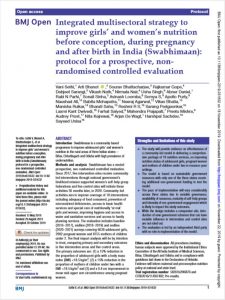
Introduction
Swabhimaan is a community- based programme to improve adolescent girls’ and women’s nutrition in the rural areas of three Indian states— Bihar, Chhattisgarh and Odisha with high prevalence of undernutrition.
Methods and analysis
Swabhimaan has a nested prospective, non- randomised controlled evaluation. Since 2017, five intervention sites receive community- led interventions through national government’s livelihood mission supported women’s self- help group federations and five control sites will initiate these activities 36 months later, in 2020. Community- led activities aim to improve coverage of 18 interventions including adequacy of food consumed, prevention of micronutrient deficiencies, access to basic health services and special care of nutritionally ‘at risk’ girls and women, improving hygiene and access to water and sanitation services and access to family planning services. The evaluation includes baseline (2016–2017), midline (2018–2019) and endline (2020–2021) surveys covering 6638 adolescent girls, 2992 pregnant women and 8755 mothers of children under 2. The final impact analysis will be by intention to treat, comparing primary and secondary outcomes in five intervention areas and five control areas. The primary outcomes are: (1) a 15% reduction in the proportion of adolescent girls with a body mass index (BMI) <18.5 kg/m2; (2) a 15% reduction in the proportion of mothers of children under two with a BMI <18.5 kg/m2 and (3) and a 0.4 cm improvement in mean mid- upper arm circumference among pregnant women.